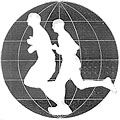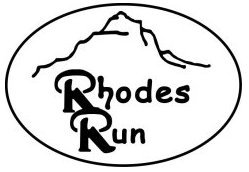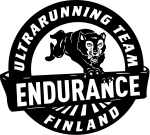World Run II / Reports
|
Loading...
|
|
The map shows the position of which the pictures for the day are taken (if any).
The start and finish markers are placed at the first and last valid registered position.
This is not nessesary the actual start and finish position, if GSM or GPS signals was not available.
|
Goto:
![]() 2011-10-09
2011-10-09
![]() 2011-10-11
2011-10-11
![]() Peru
Peru
Distance today: 27.0 km (Accumulated: 29078.0 km)
Elapsed time: 02:30:03
Country: Peru
Start 10:05am., 25c, overcast, humid & light wind, at km-stone "157" on hwy. 1NN. Finish 12:52, 34c, very humid/steamy, overcast & no wind, at monument "Correales Riqueza q. Tural" at South end of Tumbes city.
Last day in Peru !
After yesterdays 60km stage and in total about 3000km and nearly 3 months of running I have now only a small 40km stage left of this facinating, loud, quiet; relaxed, energetic; dignified, friendly and corupt contry.
If all goes well, today was the last full day in Peru and tomorrow I have
the border and the international bridge to Equador to cross. Before that a couple of hours of running, mainly through the northernmost big city in Peru, Tumbes - which as nearly all other regions of Peru is rich with historical heritage: It was 'discovered' by spanish conquistador Pizarro in 1528 upon his first landing on Peruvian soil. He ancored up in the bay, invited the by then Inca head of city abord, noted that the civilization obviously was stunningly rich and the society well orginized. Something he and the following spanish explorers would soon put an end to.
During todays run I had the thrill of passing right through the original site of the Inca city, San Pedro de los Incas, which later became modern day Tumbes. Though not much is left in terms of archeology (one have to say that the spanish often were efficient in "cleaning up" where they met artifacts or other things of historical value ;-)
The short picture-series from todays run in a way is a good goodbye' in the sense that it shows many of the caracteristics which I have enjoyed, marveled at, as well as sometimes had my troubles with.. The amazing varaiety of nature; the green parts of agriculture even in areas where one shouldnt believe it to be possible -but where its made reality due to extensive irrigation as well as persistent work; the ancient churches and official buildings and colourfull village-houses; the pestering noicy 'mini-taxies' always ready to honk their horn to attract passengers even in the most remote and blissfully silent areas ;-)
Yes, Peru is more than anything else the sum of its contrasts as also hinted in the beginning of this report. And it keeps surprising and entertaining the traveller and tickling the expedition curiosity, to the extend that I could easily spend another 3 months here - if it was not that I am at least as eager to see the finish-line of my second world run (which should be about 1 year/12000km away now).
If there is one thing I should pick out to describe Peru then it would have to be, not the obvious: its massive amount of world heritage- and historical sites, not its corruption which is the most extensive I have experiensed when running across 6 continents (! Its a mentality which seems to trancend nearly all officies and official posts from the highest to the tiniest local authority); nor its pleasant friendliness - though often peppered with the "GRINGO !!" shout as the first greeting when in the rural areas. Or its beautifull nature, rich in both sea-life, birds and a variety of landscapes ranging from the nearly 2000km long coastal semi-desert, to high snow-capped mountains, green rice-fields or steaming hot and humid banana and coconut grooves' here in Northern Peru. No, the thing which to me is the most outstanding about Peru is how it maneages its situation:
It is by UN-definition categorized as a "developing contry". And indeed, it is not as rich in products or infrastructure as Europe, N. America or its naighbours to the South - Chile and Argentina.
But; after I have literally experiensed the developing contries of N. Africa and East-Africa running step by running step all the way across their territories - then I have to say that it feels like Peru is at a completely different level. And this is meant in the most positive way:
The main infrastructure is in place and as far as I saw when running along the main connecting highway of the contry, its continiously beeing maintained and extended. The electricity and water supplies avaliable even during the long streatched out desert-areas are reliable in a way I struggle to remember them beeing in any of the developing contries in East-Africa where one of the first things to learn as a world runner' is which days the electricity is "on" in what region of the contry - and to learn at what hours there maybe is water to shower in.
One could easily explain this as a matter of different stregth of the economy. Peru beeing a lot better founded economically than most East-African contries. But this has a reason ! The most striking contrast is exactly that it seems that everyone and anyone is determined to make progress - to develop the land, make crops grow in the desert, use what must be excrutiating patience to slowly build irrigation systems and drill for wells; and when that doesnt work: to bring the water in by truck, car or donkey. It couldnt have been a stronger contrast, after having experiensed the sad state of affairs through the East-African contries where similar problems is met by a "UN/EU/The World Bank ... should solve it." (perhaps politically 'incorrect' to mention.. But what are these reports worth if they keep to the convenient 'truths' ;-)
I was stunned, also as a political scientist by education as well as a huge fan of the UN-system, to see how little initiative there were to solve own problems. All through the levels from local, regional to national level. And equally stunned to learn how many oppotunities there actually existed in those same contries - which I from news reports and even politcal sciene litterature had come to understand was in their situation mainly due to difficult climate, natural diseasters and the historical european exploitation. Instead I ran through months upon months of fertile land, much more fertile than what is to be found in most of the first 7000km I have run across in South America by now. Yet nearly nothing was made out of it. Instead extensive begging (not as I imagined, from people fighting for their chance to survive; but in most cases as a way-of-culture, asking for a mobile phone, your car (;-) etc. But no inititiative to develop the land. Strange indeed). But not as stange when seen from a sociological point of view: If for several generations a whole contry or even region of contries has learned that the main source of change and progress comes from the outside, from UN-programs, from charity organisations from bi-lateral agreements... Then slowly the connection between EFFORT and PROGRESS is cut.
It may sound a bit strong', but I was amazed to most of the time get one particular answer then asking locals why the apparently good agricultural land wasnt developed - the answer from high' and low were: "Why should we ? The UN/etc. must help us. Why should we do it ??". I guess an example of what can happen even by the best intentions - I am in big respect of the work and especially principles of both the Un and many chairty organisations and Ngo's - But, it was shocking to experiense across a whole region how it over a few generations has impacted the ability to take initiative. Good intentions - but not with very good long term effects !
This long explanation is to give an impression of that its far from a given' that a developing contry maneages as well as Peru does. And are able to have as strong and determined local willingness to bring the contry forward. A true pleasure to see :-))
Both as a political scientist and as a person sampling' the local culture around our planet.
If the contry hadnt the widespread corruption - what a fantastic place it would be. But all parts of the world has its ups & downs; Peru, just as any other.
Still, enough theory and political science thourghts. To round this "Goodbye to Peru" off, I have recieved a text from my support-driver through Southern Peru; Pavol.
It is a chance to get a different impression of the contry as well as the world run. Pali' and I may not agree on everyting - but he is one of the best expeditions members I have ever come across. Always able to solve a difficult situation, to connect' with the local culture and to bridge over differences instead of ending up in destructive confrontation (a thing which I with some viking heritage is perhaps less good at ;-). I think you'll enjoy his different take on things and the eye for the details of everyday life in Peru:
"report for jesper olsen"
/By Pavol Meszaros (Slovak Republic)
I am not writing usually very much, but Jesper offered me a possibility to report about his running journey for world-run's webpage, so I try to show it from other side of view.
About Jesper's run I heard first time in Santiago in Chile from one man, Jamie. I found it very interesting and finally I found out they were looking for someone who could make some documentary and keep a job of support driver in Peru, what exactly suited my plans as I wanted to travel to the North after my official stay in Chile as part of a university internship between Chile & the Slovak Republic
.
Now, there were some unexpected circumstances, so I came with Jamie to Peru a bit later as was planned to continue filming and to start driving. First we had to find a car and the easiest and fastest way was to hire one. Here I started to work also as translator and I tried to help to find out the best price for Jesper and this kind of negotiating followed me all the time in Peru, but i liked it and I tried to get the best possibilities.
As we came to Peru, from the first moment in this country we felt a difference, I had a feeling of more dangerous place, more people everywhere doing just anything possible to get some money and most of them is trying to sell something .. but later I became used to it and now I can say I feel already comfortable here, even though I know only a small part of this county, I met many nice people who became friends, I survived small sickness of local food and understood a bit of Peruvian culture and behavior by their historical background.
I knew that Jesper is doing about 40km a day, so I was expecting a slow traveling through one country, to feel every kilometer of this way as Jesper do and beside capturing interesting moments of this travel.
We were three at that moment. Jamie was explaining me about his movie making and beside I was accommodating to local traffic rules and also a few Jesper's rules as to keep his place in the car free to have his supplies there, silence and wait on the exact place when he came running. Jesper's rules were easy, but traffic in cities like Arequipa was from the beginning a grate challenge. Everywhere are small tico-taxies, moto-taxies or small combi-busies all of them always honking at people. And who had the most ugly sound seems winning the competition of "hit" as much people as possible. This honking is everywhere and worst are big trucks which are going fast and coming from at your back, passing just beside you. And they are many. Somewhere in the middle of desert I tried to count them and beside me passed three times more trucks than any other kinds of transport. (19 trucks and 6 cars in 20min of waiting for Jesper).
Jesper likes long straight roads without curves. That is for driver the worst if there is wind with sand, sun and big truck every minute. Many are very slow and noisy and many are very fast and silent ..the most interesting is what they have forbidden, and what is forbidden... Peruvians understand as their duty to do. Where you have a sign to say do not turn back, every bus and taxi and even big trucks turns around blocking the whole street, everyone around has to wait and start their absurd honking. Interesting is, that almost two months later I got used to that, so it doesn't make me angry anymore :-) Also surprising was for me, even in Chile, for such a huge traffic without rules there are not so many accidents and many cars are without any scratches.
But other surprise were veeery old trucks and cars with stylish lookout of scrap - rusty every part, no glass in windows, even no lights and huge black cloud of smoke behind, but still working and transporting some old bricks or new corn.
Crazy motorbikers, maybe two out of hundred i saw had a helmet. Signs are usually after the crossroad, later, even after the city you passed they will inform you there was a good hotel to stay... and many more pleasant things making the travel on the road more interesting.
But to get bored waiting for Jesper is possible even in Peru if you don't have many things to do. I tried to read a book from my Chilean girlfriend and I found out even she do not understand that Patagonian dialect, so I had a hard job to get through first 100 pages in two months. Before I thought about writing something for my architecture thesis but I was unable to concentrate on it. Quite much time of waiting I spent by taking photos around, sometimes drawing or just listening to music. Sometimes I tried to run ahead to meet Jesper, but in this case I left the car lonely beside the road and I had a bad feeling of some car can stop and rob it meanwhile I am running. So my own running was usually very short.
That feeling of danger turned into reality one day. I was beside the car when some stupid robbers held me at gunpoint. I tried not to let them get in the car, but finally after a punch in my head I resignated and only later I realized what a danger it was, that they can kill me in a second and nobody and nothing will turn back. But about this robbery Jesper already wrote something in the reports, it happened on Tuesday the 6th of September just before finish of my journey with Jesper.
My time of vacations finished and I have had to go back home to Slovakia to continue with my studies and classes at the University of Kosice.
So now I am back home in "safe" Europe. I found out that people are all around the world same, somewhere more kind somewhere more rough ... and the milk cost the same in each country ... and thanks to know Jesper more close, he is a very good and strong person.
I understood his running and how hard is to wake up every morning and see again the same tarmac road ahead. To examine different local food, its power or weakness and his effort to be fit and strong enough. How is to see every day something different.
The mind will start to thirst for stereotype of normal life.. all different turns to see the same every day and the mind gets tired, filled of experiense, and needs other kind of relax...but he has to go ahead what turns pleasant running in some way into a normal everyday hard work.
Saludos cordiales,
("Best reguards" in spanish)
Pali
(pavol.meszaros@mstein.sk)
NB: Besides working on his phd. in architecture, Pali' is a professional photographer and should media etc. need pictures from the world run 2 in Peru - he can be contacted at his email.
Myself I have just left to say:
Grazias Pali, and Grazias Peru !!











